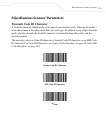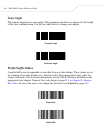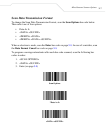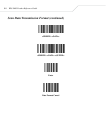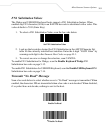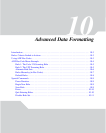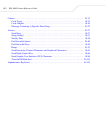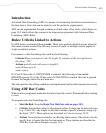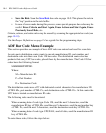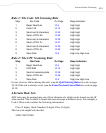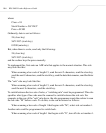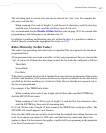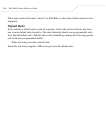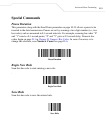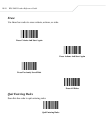
Advanced Data Formatting
10-3
Introduction
Advanced Data Formatting (ADF) is a means of customizing data before transmission to
the host device. Scan data can be edited to suit the particular requirements.
ADF can be implemented through scanning a related series of bar codes, which begin on
page 10-9 which allows the scanner to be setup and programmed with Advanced Data
Formatting (ADF) Rules.
Rules: Criteria Linked to Actions
In ADF, data is customized through rules. These rules perform detailed actions when the
data meets certain criteria. One rule may consist of single or multiple criteria applied to
single or multiple actions.
For instance, a data formatting rule could be the following:
Criteria:When scan data is Code 39, length 12, and data at the start position is
the string “129”,
Actions:pad all sends with zeros to length 8,
send all data up to X,
send a space.
If a Code 39 bar code of 1299X1559828 is scanned, the following is transmitted:
00001299<space>. If a Code 39 bar code of 1299X15598 is scanned, this rule is ignored
because the length criteria has not been met.
The rule specifies the editing conditions and requirements before data transmission occurs.
Using ADF Bar Codes
When a rule is programed, make sure the rule is logically correct. Plan ahead before starting
to scan.
To program each data formatting rule:
• Start the Rule. Scan the Begin New Rule bar code on page 10-9.
• Criteria. Scan the bar codes for all pertinent criteria. Criteria can include code type
(e.g., Code 128), code length, or data that contains a specific character string (e.g.,
the digits “129”). These options are described in Criteria on page 10-12.
• Actions. Scan all actions related to, or affecting, these criteria. The actions of a rule
specify how to format the data for transmission. These options are described in
ADF Bar Code Menu Example on page 10-4.



